 W
WThe All-American Strongman Challenge is a leading competition in strength athletics that takes place within the annual Californian FitExpo. Although North America has a number of prestigious strongman events determining the "Strongest Man in America", the "Strongest Man in Canada" and the "Strongest Man in North America", the All-American Strongman Challenge has added kudos because it is open to entrants from overseas with the potential to bring in leading international competitors as well. It is notable for the calibre of entrants it has attracted, with many World's Strongest Man finalists being represented.
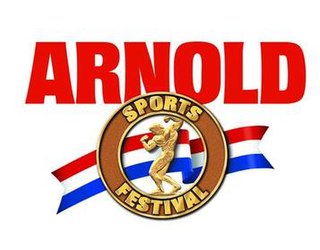 W
WThe Arnold Strongman Classic is an annual competition featuring strength athletes from all over the world. Created by Arnold Schwarzenegger and Jim Lorimer, it is an offshoot of the Arnold Sports Festival which takes place annually in Columbus, Ohio, USA.
 W
WThe Beauty and The Beast Strongman Challenge, also known as the Beauty and The Beast World Strongman Challenge was a short-lived annual strongman competition that was notable for the calibre of the entrants it attracted, as well as for the reputation it attained in a short amount of time.
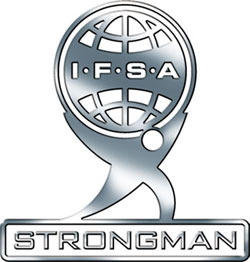 W
WThe International Federation of Strength Athletes was an international governing body for strongman competition. IFSA operated from 1995-2007 and was based in Glasgow, Scotland.
 W
WThe Fortissimus is a defunct event in strength athletics. The name means "the mightiest" and was a multi-event challenge at the end of which the winner is crowned as the "Strongest Man on Earth". It was set up to bring together the strongest competitors on the planet independent of the organisations to which they were signed, and also as a tribute to the nineteenth-century Canadian strongman Louis Cyr, which gave it many similarities to Le Defi Mark Ten International which last took place in Canada in the early 1990s. After its first airing in 2008, the strength athletics magazine Milo described it as the ultimate strongman competition ever held. Despite a successful edition in 2009, a reported lack of a major sponsor for 2010 resulted in the competition being suspended, no future contests have been announced.
 W
WGiants Live was created in 2009 as the official Tour that qualifies strongmen to compete in the annual World's Strongest Man contest. At each Grand Prix, up to twelve international strongmen come together and compete over six events. The top three at each contest will receive an invitation to compete at the World's Strongest Man contest for that same year.
 W
WThe GNC Grip Gauntlet is a strength athletics contest that tests the grip strength of competing individuals over three disciplines, each designed to test one of the three recognised facets of hand strength: crushing; pinching; and supporting. It was developed by Wade and Brad Gillingham and became an internationally recognised contest featured at some of the world's most prominent strength athletics events and expos, including the Arnold Strongman Classic and the various WSM Super Series Grand Prixs. The last time the GNC Grip Gauntlet was run in a competitive format was the 2010 Arnold Classic. Since that time the challenge has changed to an informal challenge with no official results maintained. Prizes are still awarded for successful completion of the challenge.
 W
WThe Highlander Challenge World Championships is a tournament that marries traditional Highland Games with more contemporary strength athletics. It was created to help reinvigorate Highland Games in Scotland by giving a modern and aspirational image while maintaining the tradition inherent in the history of the sport.
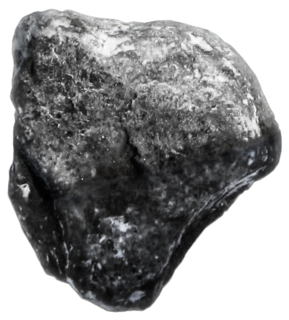 W
WThe Húsafell Stone is a lifting stone located in Húsafell, Iceland. The stone weighs 186 kg (409 lb) and was kept near a sheep pen built by reverend Snorri Björnsson over two hundred years ago.
 W
WThe International Federation of Strength Athletes was an international governing body for strongman competition. IFSA operated from 1995-2007 and was based in Glasgow, Scotland.
 W
WThe International Federation of Strength Athletes was an international governing body for strongman competition. IFSA operated from 1995-2007 and was based in Glasgow, Scotland.
 W
WLifting stones are heavy natural stones which people are challenged to lift, proving their strength. They are common throughout northern Europe, particularly Scotland, Wales, Iceland, Scandinavia and North West England centred around Cumbria.
 W
WThe GNC Grip Gauntlet is a strength athletics contest that tests the grip strength of competing individuals over three disciplines, each designed to test one of the three recognised facets of hand strength: crushing; pinching; and supporting. It was developed by Wade and Brad Gillingham and became an internationally recognised contest featured at some of the world's most prominent strength athletics events and expos, including the Arnold Strongman Classic and the various WSM Super Series Grand Prixs. The last time the GNC Grip Gauntlet was run in a competitive format was the 2010 Arnold Classic. Since that time the challenge has changed to an informal challenge with no official results maintained. Prizes are still awarded for successful completion of the challenge.
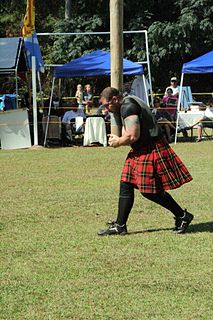 W
WThe Scotland County, North Carolina Highland Games, or SCHG, are a Scottish event held in Laurinburg, North Carolina, United States. Each year, the games are held the first weekend of October at the John Blue House and Grounds in Laurinburg. The event was started in 2009 after the Flora MacDonald Games in Red Springs, North Carolina were discontinued.
 W
WThe Strongman Champions League is a strongman competition circuit, with several Grand Prix events throughout the year and the Strongman Champions League overall champion title going to the overall winner at the end of the season. The competitors include some of the top athletes in the sport, including Žydrūnas Savickas, Krzysztof Radzikowski, Travis Ortmayer, Nick Best, Mikhail Koklyaev, Ervin Katona, Andrus Murumets, Laurence Shahlaei, Vytautas Lalas and Terry Hollands. Initially in close partnership with IFSA, it quickly asserted its independence and has acted as a unifying force in the world of strength athletics, bringing together athletes from IFSA with those affiliated to the World's Strongest Man circuit, and having close cooperation with other major events such as Fortissimus. In 2012, SCL began co-promoting the new Arnold Strongman Classic-Europe contest which will become part of the annual SCL season of events.
 W
WThe Strongman Super Series, known from 2001 to 2004 as the IFSA World Strongman Super Series, from 2005 to 2008 as the World's Strongest Man Super Series, and reverting in 2009 to the World Strongman Super Series, is a sequence of grand prix events in the sport of strength athletics. It was introduced in 2001 in response to concerns that, unlike other individual sports such as golf or tennis, there was no recognized international "tour" in strength athletics. The Strongman Super Series ensures that there are a number of high-profile, professionally run contests during the year, with competitors' placings being used to decide the overall Super Series Champion.
 W
WThe International Federation of Strength Athletes was an international governing body for strongman competition. IFSA operated from 1995-2007 and was based in Glasgow, Scotland.
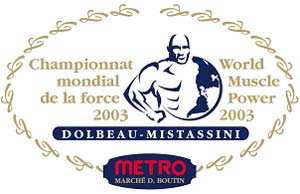 W
WThe World Muscle Power Classic (WMPC) was one of the most enduring annual strongmen competitions, running for twenty years and in that time attaining the position of the second most prestigious strongman contest in the world, after the World's Strongest Man. It was notable for that reason and for the quality of the strength athletes it attracted, which included every winner of the World's Strongest Man competition from 1980 onwards including Jón Páll Sigmarsson, Geoff Capes and Bill Kazmaier from the 1980s right up to the five time WSM champion Mariusz Pudzianowski, who was never able to capture the WMPC title.
 W
WThe World's Strongest Man is an international strongman competition held every year. Organized by American event management company IMG, a subsidiary of Endeavor, it is broadcast in the US during summers and in the UK around the end of December each year. Competitors qualify based on placing in the top three at the four to eight Giants Live events each year.